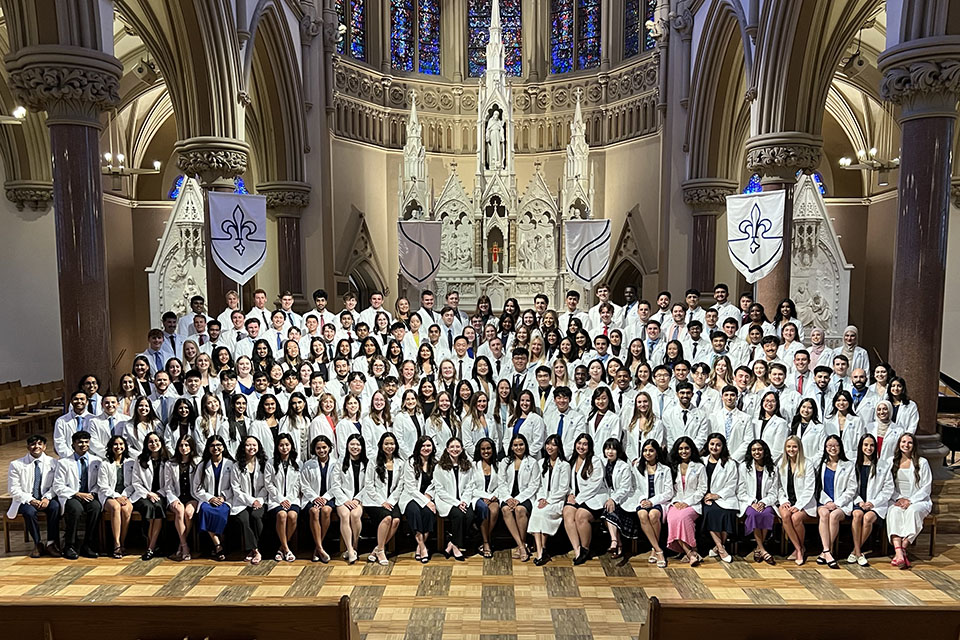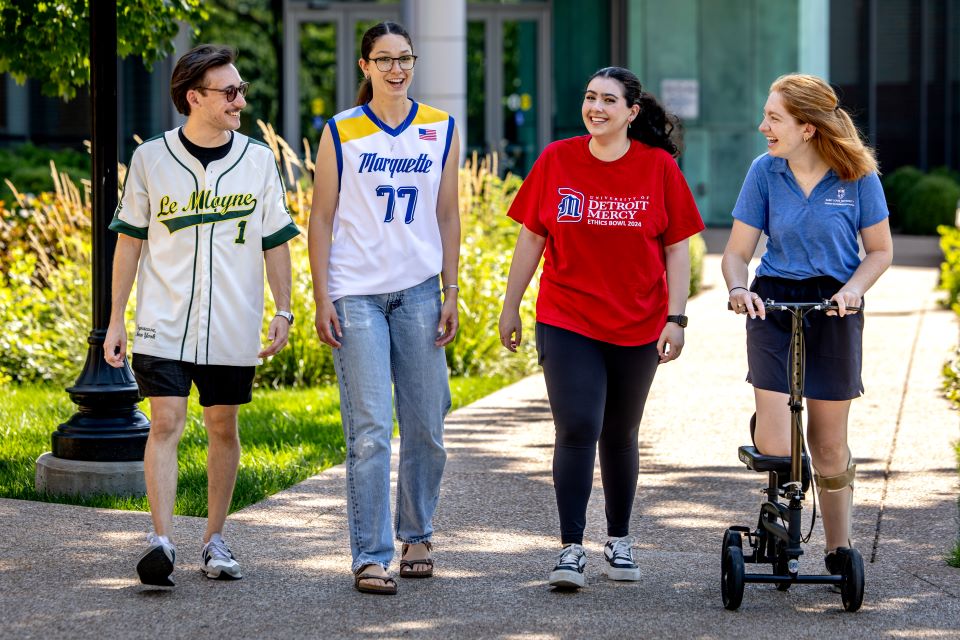Innovative Software Lab at Saint Louis University Receives Second Round of Funding from Alfred P. Sloan Foundation
A grant from the Foundation established Open Source with SLU in 2022
ST. LOUIS – Open Source with SLU (OSS), a pioneering software engineering lab at Saint Louis University, has received a $654,610 grant from the Alfred P. Sloan Foundation to continue advancing open scholarship and developing open-source software.

Kate Holdener, Ph.D., assistant professor of computer science at SLU, and Daniel Shown, OSS Program Director, run Open Source with SLU. Photo by Sarah Conroy.
OSS was established in 2022 when the Sloan Foundation awarded Kate Holdener, Ph.D., assistant professor of computer science at SLU, a grant to aid in the lab's founding. The current funding will aid Holdener and Daniel Shown, OSS Program Director, in their goal to have OSS achieve financial independence by the 2026-27 academic year.
“We are very thankful to the Sloan Foundation for this grant,” Holdener said. “With this new round of funding, we will deepen the roots of Open Source with SLU, and work toward making this a permanent facility within the University.”
The Center engages graduate and undergraduate students in open-source software development, focusing on research software projects that help SLU faculty reach and advance their research goals. Faculty members can submit software requests for graduate students and SLU researchers to prototype and design software solutions.
“Dr. Holdener had an idea, and we tested that idea,” Shown said. “The great news is we have found methods and patterns that work. Now we’re working on bringing these to more partners and making the program a long-term success.”
Undergraduate computer science students enrolled in project-based courses work with OSS as part of their course curriculum, working under the mentorship of graduate students to implement various designs and produce software using industry-standard practices.
“OSS addresses two significant challenges in universities: providing experience-based software engineering education and supporting the development and maintenance of custom research software,” Holdener said.
Shown said OSS is creating a talent and solution pipeline for software development. The team currently includes 20 graduate students and three part-time developers.
OSS has developed several impactful tools for SLU partners in its first two years, including MeltShiny for computational chemistry, Seeing-Is-Believing for language education, and Where's Religion for religious studies research.
Other projects include aiding a volunteer group with a site to track staffing at emergency homeless shelters.
Earlier this year, OSS released its first project to an external partner. Holdener and Shown hope to continue to build collaboration with industry and academic partners.
“Our graduate students are getting real experiences as technical mentors and trusted partners for our clients,” Shown said. “They are ready to be leaders. The program is really about sustaining innovation in both research and industry. We’re providing a pipeline for talent, expertise, and solutions.”
SLU researchers and faculty may request development or updates to open-source software for research endeavors. Questions can be directed to oss@slu.edu.
Alfred P. Sloan Foundation
The Alfred P. Sloan Foundation is a not-for-profit, mission-driven grantmaking institution dedicated to improving the welfare of all through the advancement of scientific knowledge. Established in 1934 by Alfred Pritchard Sloan Jr., then-President and Chief Executive Officer of the General Motors Corporation, the Foundation makes grants in four broad areas: direct support of research in science, technology, engineering, mathematics, and economics; initiatives to increase the quality, equity, diversity, and inclusiveness of scientific institutions and the science workforce; projects to develop or leverage technology to empower research; and efforts to enhance and deepen public engagement with science and scientists.
Saint Louis University
Founded in 1818, Saint Louis University is one of the nation’s oldest and most prestigious Catholic institutions. Rooted in Jesuit values and its pioneering history as the first university west of the Mississippi River, SLU offers more than 15,200 students a rigorous, transformative education of the whole person. At the core of the University’s diverse community of scholars is SLU’s service-focused mission, which challenges and prepares students to make the world a better, more just place.
Latest Newslink
- SLU Welcomes 175 New Medical Students at White Coat CeremonySaint Louis University’s School of Medicine marked a pivotal milestone for 175 incoming medical students at its annual White Coat Ceremony. On Sunday, July 27, faculty, family, and friends convened at St. Francis Xavier College Church to honor the students' achievements and their forthcoming pledge to the medical profession.
- Saint Louis University Hosts National Jesuit Student Leadership ConferenceSaint Louis University hosted student government leaders from Jesuit colleges and universities on campus July 22-26. This was the first time SLU hosted the National Jesuit Student Leadership Conference.
- James Hitchcock, Ph.D.: 1938-2025James F. Hitchcock, Ph.D., professor emeritus of history, died Monday, July 14, 2025. He was 87. Hitchcock authored several books on the history of the Catholic Church.
- Lentine Receives Award of Merit for Outstanding Contributions to Scientific MedicineKrista Lentine, M.D., Ph.D., professor of medicine at Saint Louis University's School of Medicine, is the 2024 recipient of the St. Louis Metropolitan Medicine Society Award of Merit for Outstanding Contributions to Scientific Medicine.
- We Should Treat More People with Hepatitis B, SLU Expert SaysIn a pair of articles published in Lancet Gastroenterology and Hepatology, scientists lay out the case for why we should expand treatment recommendations for people with hepatitis B.
- Running Interference: Scientists Block Viral RNA, Aim to Cure Hepatitis BIn a recent paper published in Science Translational Medicine, a SLU scientist reports that a class of drugs called RNA interference (RNAi) therapeutics represent a major advancement in the treatment of chronic hepatitis B virus infections.













